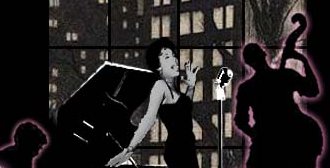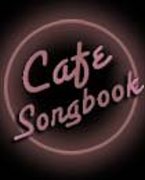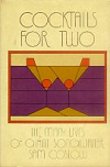Welcome toCafe SongbookInternet Home of the |
 |
 |
| Home || Songs || Songwriters || Performers || Articles and Blogs || Glossary || About Cafe Songbook || Contact/Submit Comment | |
| Search Tips: 1) Click "Find on This Page" button to activate page search box. 2) When searching for a name (e.g. a songwriter), enter last name only. 3) When searching for a song title on the catalog page, omit an initial "The" or "A". 4) more search tips. | |
My Old Flame |
||
Written: 1934 |
Words and Music by: Sam Coslow and Arthur Johnston |
Written for: Belle of the Nineties (movie, 1934) |
| Page Menu | ||
| Main Stage || Record/Video Cabinet || Reading Room || Posted Comments || Credits | ||
On the Main Stage at Cafe Songbook | |
(Please complete or pause one video before starting another.) |
Carmen McRae
|
Cafe Songbook Reading Room"My Old Flame" |
||
| About the Movie Belle of the Nineties / Origins of the Song | ||
|
The sheet music for "My Old Flame credits both Coslow and Johnston for music and lyrics, however, various other references, including Robert and Robert Kimball in their book Reading Lyrics suggest Johnston wrote the music and Coslow the words. Coslow himself in his autobiography Cocktails for Two just says he and Johnston "collaborated" on the song. However, in his comment quoted below on Duke Ellington congratulating him on writing "My Old Flame" there is an implication that Ellington is referring to the music, as he almost never wrote the lyrics for his own songs. In his autobiography, Coslow gives some background on the Mae West performance of "My Old Flame" when he points out that having her do "a torch ballad" was something new for her. Coslow goes on:
Coslow also recalls that during a visit he later paid to Ellington he received one of his greatest compliments: "Duke volunteered the statement that if there were one song by another writer he wished he had written, it would be 'My Old Flame'" (Coslow, p. 151).
(This section remains in preparation.) |
|
| back to top of page | ||
| Critics Corner | ||
 Alec Wilder, American Popular Song The Great Innovators, 1900-1950, New York: Oxford University Press, 1972. |
Alec Wilder calls "My Old Flame" "A very fine song!" taking particular note of several devices used by the composers: how "beautifully" they employ a technique, used in many other songs, of "dropping down to a note not in the scale of the key in which the song is written"; contrasting the opening measures by having the melody go into a "small dance for itself"; and finally "moving into the key of B fat quite unexpectedly. The whole release, again returning to B flat for a moment is a particular prize." (To illustrate, Wilder reproduces the portions of the score in which these techniques are used.) --see Wilder, pp. 483-484, hard cover edition.) |
|
|
For Ted Gioia, The song is especially interesting because it is written in a major key but sounds minor, and because it combines two contrary modes: intimacy and intricacy, a combination that "casts a certain charm over performances of the standard." He notes that the song has retained and even increased its popularity with jazz musicians having received more recordings in the first decade of the twenty-first century than in the thirties and forties combined (pp. 282-284). | |
| (This section remains in preparation.) | ||
| back to top of page | ||
| Lyrics Lounge | ||
Currently no source for providing the lyrics is available; however Ella Fitzgerald sings the lyric, including the verse, exactly as it was written. The complete, authoritative lyrics for "My Old Flame" can be found in:
Click here to read Cafe Songbook lyrics policy. |
||
| back to top of page | ||
Visitor CommentsSubmit comments on songs, songwriters, performers, etc.
Feel free to suggest an addition or correction. Please read our Comments Guidelines before making a submission. (Posting of comments is subject to the guidelines. Not all comments will be posted.) |
| To submit a comment, click here. |
Posted Comments on "My Old Flame":
No Comments as yet posted |
| back to top of page |
Credits("My Old Flame" page) |
Credits for Videomakers of videos used on this page:
Borrowed material (text): The sources of all quoted and paraphrased text are cited. Such content is used under the rules of fair use to further the educational objectives of CafeSongbook.com. CafeSongbook.com makes no claims to rights of any kind in this content or the sources from which it comes.
Borrowed material (images): Images of CD, DVD, book and similar product covers are used courtesy of either Amazon.com
Any other images that appear on CafeSongbook.com pages are either in the public domain or appear through the specific permission of their owners. Such permission will be acknowledged in this space on the page where the image is used.
For further information on Cafe Songbook policies with regard to the above matters, see our "About Cafe Songbook" page (link at top and bottom of every page). |
The Cafe Songbook |
||||
|
Performer/Recording Index
(*indicates accompanying music-video)
|
||||
| back to top of page | ||||
1934
Notes: The song was written for Mae West to perform in the 1934 movie, Belle of the Nineties The track of "My Old Flame" on the music-video above is from the soundtrack of the movie Belle of the Nineties, on which Mae West is accompanied by Ellington and his orchestra. The Duke recorded nother version of "My Old Flame" with vocal by Ivie Anderson (recorded May 9, 1934) that is on the Ellington Orchesra album Raisin' The Rent.
(Please complete or pause one |
||||
| back to top of page | ||||
1941
Notes: Coslow states, "Peggy's rendition of My Old Flame" on the Goodman record is one of my prize possessions"( Coslow, p. 201). The video below provides two takes of the Goodman rendition with Lee as vocalist. According to Ivan Santiago-Mercado, Peggy Lee's discographer, the two takes were made on August 20, (Chicago) and October 2, (New York) 1941, with the latter being the one that became the master for the original recording and for subsequent re-releases of "My Old Flame." |
||||
| back to top of page | ||||
1944
Notes: Billie is accompanied by Eddie Heywood and orchestra featuring Doc Cheatham, trumpet; Lem Davis, alto sax; Vic Dickenson, trombone; Eddie Heywood, piano; Teddy Walters, guitar; John Simmons, bass; and ‘Big Sid’ Catlett, drums (originally on Commodore 78rpm 10 inch, 585B-A4743-1). |
||||
| back to top of page | ||||
1947
Notes: Ted Gioia says the recording Parker et. al. made for the Dial label November 4, 1947, "ranks with the most moving ballad performances of his career." |
||||
| back to top of page | ||||
1954
Notes: "Chet Baker (trumpet) was arguably at the peak of his prowess when captured in a quartet setting at the Masonic Temple in Ann Arbor, MI, May 9, 1954. He's joined by Russ Freeman (piano), Carson Smith (bass) and Bob Neel (drums), all of whom provide ample assistance without ever obscuring their leader's laid-back and refined style" (from CD Universe Product Description).. |
||||
| back to top of page | ||||
1956
Notes: Miles Davis, Sonny Rollins, and Art Blakey combine on Dig, recorded in 1951, except for "My Old Flame" and "Conception" which date from 1956, and appear on a later release of the album. (The other musicians are pianist Walter Bishop, alto saxophonist Jackie McLean, and bassist Tommy Potter. |
||||
| back to top of page | ||||
1976
Notes: "This is the second half of a previously unreleased Carmen McRae live performance from Ratso's jazz club in Chicago in 1976, and McRae is at her best. The play list for this volume is completely different than that appearing on Vol. 1. Nonetheless, it also is an eclectic offering of songs from a variety of composing sources, including Barry Mann, Marilyn & Alan Bergman, and Jimmy Rowles, to name a few. . . . . More rapid cadence pieces are prevalent on this volume than the first. . . . Her trio of Marshall Otwell, Ed Bennett, and Joey Baron are superlatively on the same page throughout the set" (from iTunes |
||||
| back to top of page | ||||
1978
Notes: "This set features the great Sarah Vaughan in a typically spontaneous Norman Granz production for Pablo with pianist Oscar Peterson, guitarist Joe Pass, bassist Ray Brown, and drummer Louie Bellson. Sassy sounds wonderful stretching out on such songs as "Midnight Sun," "More Than You Know," "Teach Me Tonight," and "Body and Soul," among others. All ten of the melodies are veteran standards that she knew backwards but still greeted with enthusiasm. A very good example of late-period Sarah Vaughan" (Scott Yanow at CD Universe). |
||||
| back to top of page | ||||
1984
Notes: Lush Life is the second in Ronstadt's series of three albums devoted to American standard songs, all with arrangements and orchestra conducted by Nelson Riddle, the others being What's New
(Please complete or pause one |
||||
| back to top of page | ||||
1996
Notes: Tony is accompanied by Ralph Sharon on piano, with string arrangements by Jorge Calandrelli. He includes the verse in this rendition. |
||||
| back to top of page | ||||
2010
Notes: Rebecca Kilgore (vocals and guitar); Eddie Erickson (the same plus banjo-- and does the vocal on "My Old Flame"), Dan Barrett (trombone, cornet, piano, arrangements, vocals) and Joel Forbes (string bass) -- who is featured on the "My Old Flame track. (See review at Jazz Lives.) |
||||
| back to top of page |
| Home || Songs || Songwriters || Performers || Articles and Blogs || Glossary || About Cafe Songbook || Contact/Submit Comment | |
© 2009-2018 by CafeSongbook.com -- All Rights Reserved |



